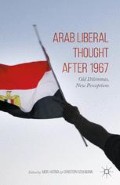Abstract
In an interview with historian Ahmad Beydoun, published in the newspaper al-Wasat in 1996, the Lebanese singer Ziad al-Rahbani tells the story of how, as a teenager, he longed intensely to be with the “real people.” He was ready to literally jump out of the window and roam the streets in order to connect with “real life” and learn from it. As the son of the iconic Lebanese singer Fairuz and her songwriter husband ’Asi al-Rahbani, Ziad grew up in a musical and artistic environment, but also in what felt to him like a secluded upper-middle-class cocoon in a wealthy suburb north of Beirut, where he attended an elite French-language school.
Access this chapter
Tax calculation will be finalised at checkout
Purchases are for personal use only
Preview
Unable to display preview. Download preview PDF.
Notes
Ziad Rahbani interviewed by Ahmad Beydoun, quoted in Fadi Bardawil, “Art, War and Inheritance: The Aesthetics and Politics of Ziad Rahbani” (MA thesis, Beirut: American University of Beirut, 2002), p. 48.
Christopher Stone, Popular Culture and Nationalism in Lebanon: The Fairuz and Rahbani Nation (London: Routledge, 2007), p. 119.
Susanne Kamel Abou-Ghaida, “Analyzing the Ziyad Rahbani Phenomenon through Fan Discourse” (MA thesis, Beirut: American University of Beirut, 2002), pp. 30–38.
Sune Haugbølle, War and Memory in Lebanon (Cambridge: Cambridge University Press, 2010), pp. 111–114.
Michael Freeden, “Failures of Political Thinking,” Political Studies 57 (2009), pp. 141–164.
Edward P. Thompson, The Making of the English Working Class (London: IICA, 1963).
Susan Smulyan, Popular Ideologies: Mass Culture at Mid-Century (Philadelphia: University of Pennsylvania Press, 2010).
Walter Armbrust, Mass Culture and Modernism in Egypt (Cambridge: Cambridge University Press, 1996);
Joel Gordon, Revolutionary Melodrama: Popular Film and Civic Identity in Nasser’s Egypt (Chicago, IL: Middle East Documentation Center, 2002).
H. B. McCullough, Political Ideologies (Oxford: Oxford University Press, 2010).
Verena Klemm, “Different Notions of Commitment (iltizam) and Committed Literature (al-adab al-multazim) in the Literary Circles of the Mashriq,” Middle Eastern Literatures 3/1 (2000), pp. 51–62.
Michael Kazin, American Dreamers: How the Left Changed a Nation (New York: Knopf, 2011).
Karl Marx and Friedrich Engels, The German Ideology (New York: International, 1970), p. 42.
Matthew Sharpe, “The Aesthetics of Ideology, or ‘The Critique of Ideological Judgment’ in Eagleton and Žižek,” Political Theory 34/1 (2006), pp. 95–120.
Terry Eagleton, Ideology: An Introduction (London: Verso, 2001), p. 63.
Charles Kurzman (ed.), Liberal Islam: A Sourcebook (Oxford: Oxford University Press, 1998);
Christoph Schumann (ed.), Liberal Thought in the Eastern Mediterranean: Late 19th Century until the 1960s (Leiden: Brill, 2008);
Christoph Schumann (ed.), Nationalism and Liberal Thought in the Arab East: Ideology and Practice (London: Routledge, 2010);
Meir Hatina, “Arab Liberal Discourse: Old Dilemmas, New Visions,” Middle East Critique 20/1 (2011), pp. 3–20.
Albert Hourani, Arabic Thought in the Liberal Age 1798–1939 (Cambridge: Cambridge University Press, 1962).
Nada A’war, “The Political Song in Lebanon, 1970–1986” (MA thesis, Beirut: American University of Beirut, 1988).
Nick Cohen, What’s Left? How Liberals Lost Their Way (London: Fourth Estate, 2007).
Manfred B. Steger, The Rise of the Global Imaginary: Political Ideologies from the French Revolution to the Global War on Terror (Oxford: Oxford University Press, 2008).
David Scott, Conscripts of Modernity: The Tragedy of Colonial Enlightenment (Durham, NC: Duke University Press, 2004).
Ahmad Beydoun, “A Note on Confessionalism,” in Lebanon in Limbo, ed. Theodor Hanfand Nawaf Salam (Baden-Baden: Nomos, 2003), pp. 75–86.
Asef Bayat, Life as Politics: How Ordinary People Change the Middle East (Stanford, CA: Stanford University Press, 2010).
Elizabeth Suzanne Kassab, Contemporary Arab Thought: Cultural Critique in Comparative Perspective (New York: Columbia University Press, 2010);
Michaelle Browers, Political Ideology in the Arab World: Accommodation and Transformation (Cambridge: Cambridge University Press, 2009).
Sune Haugbølle, “The Victim’s Tale in Syria: Imprisonment, Individualism, and Liberalism,” in Policing and Prisons in the Middle East: Formations of Coercion,” ed. Laleh Khalili and Julian Schwedler (London: Hurst, 2009), pp. 223–240.
Anna Krylova, “The Tenacious Liberal Subject in Soviet Studies,” Kritika: Explorations in Russian and Eurasian History 1/1 (2000), pp. 119–146.
Lisa Wedeen, Ambiguity of Domination: Politics, Rhetoric, and Symbols in Contemporary Syria (Chicago: University of Chicago Press, 1999).
Editor information
Copyright information
© 2015 Meir Hatina and Christoph Schumann
About this chapter
Cite this chapter
Haugbølle, S. (2015). Ziad al-Rahbani and the Liberal Subject. In: Hatina, M., Schumann, C. (eds) Arab Liberal Thought after 1967. Palgrave Macmillan, New York. https://doi.org/10.1057/9781137551412_10
Download citation
DOI: https://doi.org/10.1057/9781137551412_10
Publisher Name: Palgrave Macmillan, New York
Print ISBN: 978-1-349-55368-6
Online ISBN: 978-1-137-55141-2
eBook Packages: Palgrave Religion & Philosophy CollectionPhilosophy and Religion (R0)

